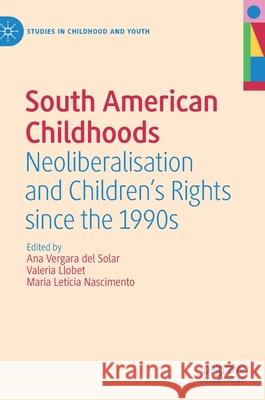South American Childhoods: Neoliberalisation and Children's Rights Since the 1990s » książka
topmenu
South American Childhoods: Neoliberalisation and Children's Rights Since the 1990s
ISBN-13: 9783030789480 / Angielski / Twarda / 2021 / 326 str.
Kategorie:
Kategorie BISAC:
Wydawca:
Palgrave MacMillan
Seria wydawnicza:
Język:
Angielski
ISBN-13:
9783030789480
Rok wydania:
2021
Wydanie:
2021
Numer serii:
000401213
Ilość stron:
326
Waga:
0.52 kg
Wymiary:
21.01 x 14.81 x 1.91
Oprawa:
Twarda
Wolumenów:
01
Dodatkowe informacje:
Wydanie ilustrowane











